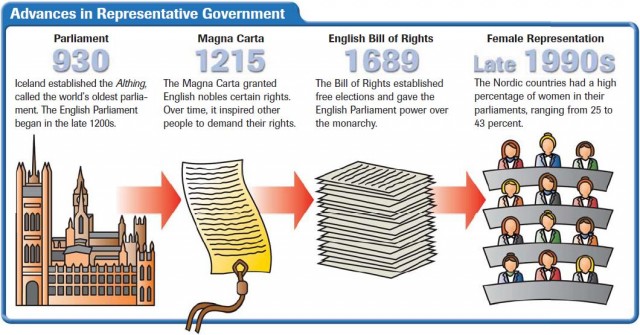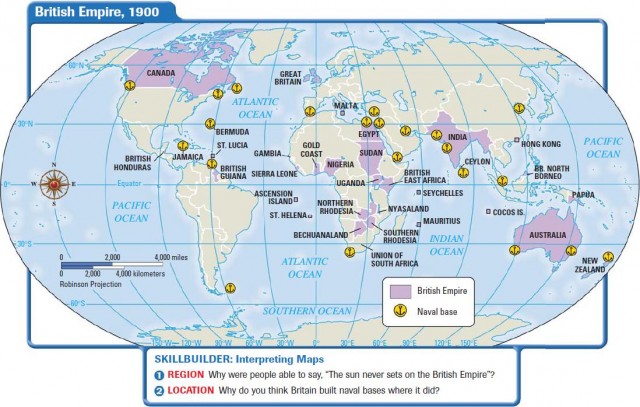Northern Europe
A HUMAN PERSPECTIVE In World War II, Germany perfected a new military tactic, the blitzkrieg. Using a massive force of dive-bombers, tanks, and artillery, the German army rapidly surprised, attacked, and defeated a foe before it could mount a defense. Germany used blitzkriegs to invade Poland, Belgium, the Netherlands, and France. But Germany couldn't launch a swift land attack against the United Kingdom on the island of Great Britain. Germany tried to destroy Britain by first bombing it from the air, but such a campaign took time, so Britain was able to fight back. In time, Britain and its allies won the war. Throughout its history, Britain's status as an island has been a geographic advantage.
A History of Seafaring Conquerors
Today, Northern Europe consists of the United Kingdom, Ireland, and the Nordic countries. The Nordic countries are Denmark, Finland, Iceland, Norway, and Sweden. The history of this region has been a history of using the sea and of conquest.
EARLY CONQUERORS
In ancient times, waves of migrating people settled Northern Europe. Each new group tended to push the previous residents out of its way. As a result, the earlier groups ended up living at the tips or along the coasts of Northern Europe's peninsulas and islands. For example, the Sami, descendants of one of the earliest migrating groups, now live in far northern Scandinavia and Finland.
The ancient inhabitants of Great Britain were Celtic.
Roman armies conquered southern Britain by about A.D. 80. In the 400s, Germanic tribes invaded, driving out the Romans and gradually pushing the Celts north and west. Beginning about 795, a group of seafaring warriors from Denmark, Norway, and Sweden terrorized Europe. These Norsemen, or Vikings, sailed in long ships to coastal towns and conducted hit-and-run raids. They conquered parts of Britain and sailed to Iceland, Greenland, and even North America. They also had a settlement in Normandy (a part of France named for the Norsemen) and moved into Russia.
In 1066,William the Conqueror of Normandy conquered England (the largest kingdom in Britain) and began to rule it. The Normans spoke French, and over time the English language acquired many words of French origin.
DREAMS OF EMPIRE
Denmark, Sweden, and Norway each became a kingdom during the 900s. Sweden was a strong power in the 1600s, but no Nordic country ever became a major empire.
In contrast, Great Britain built an empire that strongly affected the rest of the world. First, the English set out to control the British Isles. Over time, England won control of its neighbors, Wales, Ireland, and Scotland. In 1801, the nation became known as the United Kingdom of Great Britain and Ireland.
Britain drew on its geographic advantages to grow in strength. As you read earlier, Britain's status as an island helped protect it. After 1066, no outside power ever successfully invaded Britain. In addition, the British people had much experience as sailors. This helped them to build a strong navy and to develop overseas trade.
Drawing on its economic and naval strength, Great Britain built a global empire. By the 1800s, it had colonies in the Americas, Asia, Africa, and Oceania. A popular saying declared, “The sun never sets on the British Empire.” One consequence of the empire is that the English language and British culture spread worldwide.
Moving into the Modern Age
Great Britain played a role in shaping our modern world in two ways. It helped to develop representative government. Also, the industrial revolution started in Britain and spread to other countries.

REPRESENTATIVE GOVERNMENT
Britain's government is a monarchy that also has a parliament. A parliament is a representative lawmaking body whose members are elected or appointed. (In some cases, they inherit the position.) Over the centuries, English rulers lost power to the English Parliament, so a more representative government evolved. For example, in 1215 nobles forced the king to sign the Magna Carta. That document inspired such political ideas as trial by jury and no taxation without representation. Those ideas later spread to the United States, Canada, and various British colonies.
The Nordic countries also developed representative government. Iceland's parliament, which has been meeting since 930, is the oldest parliament in the world.

INDUSTRIAL REVOLUTION
As you read in Chapter 12, deposits of iron ore and coal helped Britain to be the first nation to industrialize. Industry used coal as fuel and iron to make machinery. The growth of industry motivated Britain's empire building. Britain imported raw materials from its colonies and sold finished goods to those colonies. In the 1800s, the industrial revolution spread from Britain to other countries, especially Belgium, France, Germany, and the United States. Of the Nordic countries, Sweden developed the most industry.
SINCE 1900
In the 20th century, the Nordic countries did not heavily involve themselves in other nations' affairs. But Great Britain played a major role in both world wars, fighting as one of the victorious Allies. After World War II, the British Empire underwent major change as nearly all of its colonies gained independence. Since then, some former colonies, such as Nigeria, have had ethnic conflicts. Many of the conflicts arose because the British had set the boundaries of their colonies without regard to where rival ethnic groups lived.
THE IRISH QUESTION
The British still face a problem that has roots in the past. Protestant English rulers strengthened their hold on Catholic Ireland by seizing Irish land and giving it to Scottish and English Protestants. That left many Irish in poverty. In the 1840s, potato crops failed and caused famine. Over a million Irish fled to other lands.
Many Irish called for independence, and in 1921, Britain divided Ireland into two states. The Republic of Ireland gained independence in 1921. Northern Ireland, which had a Protestant majority, remained part of the United Kingdom. Since then, religious conflict and anti-British violence have plagued Northern Ireland.
Economics: Diversity and Change
Today, Northern Europe has a highly developed and varied economy. Manufacturing and traditional economic activities such as fishing and forestry remain important. As is true in all developed countries, the service and information economies are growing.
INDUSTRY AND RESOURCES
Sweden and the United Kingdom have many types of manufacturing in common. For example, both nations have strong motor vehicle and aerospace industries. Both also produce paper products, food products, and pharmaceuticals.
Northern Europe's economy benefits from its many natural resources. Sweden exports timber. Iceland relies heavily on its fishing industry and the production of fish products. Norway earns a large portion of its income from North Sea oil.
HIGH-TECH
Technology is swiftly changing the economy of Northern Europe. For example, the production of computer software and hardware has been a major part of Ireland's economy since the 1970s. The section of Scotland between Glasgow and Edinburgh is called Silicon Glen because it has so many high-tech companies (which use silicon computer chips). Silicon Glen produces 32 percent of Europe's personal computers and 51 percent of Europe's notebook computers.
UNION OR INDEPENDENCE?
Most nations of this region joined the European Union (EU), but Norway has chosen not to do so. Even in nations belonging to the European Union, people have mixed feelings about the EU policy that they should adopt a common currency called the euro. In September 2000, Denmark voted against adopting the euro. Economics professor Jesper Jespersen agreed with that decision. He said, “I believe Denmark should retain its own currency . . . [because] our economy is in many ways independent of the eurozone [the region using the euro].”
Cultural Similarities and Modern Art
Throughout most of history, Northern Europe has not been culturally diverse. Even today, the Nordic nations have populations that consist mostly of one ethnic group. In recent years, however, the United Kingdom, particularly its capital London, has grown more diverse. That is partially due to immigration from former colonies, such as India. By the year 2005, more than 1.8 million of London's 7.2 million residents belonged to an ethnic minority.
SIMILAR LANGUAGES AND RELIGIONS
The language map on page 267 shows the effect of historic migrations into this region. Most people of Northern Europe speak a Germanic language. When Germanic tribes migrated to the Scandinavian Peninsula and the British Isles, they pushed the previous inhabitants north and west. Today, the Sami language is spoken in the far north. Celtic languages such as Welsh, Irish Gaelic, and Scottish Gaelic survive on the northern and western edges of the British Isles.
The Reformation, which began in nearby Germany in the 1500s, swept through Northern Europe. Several different Protestant churches took root there. Most of the region is still Protestant. Only Ireland kept Catholicism as its main faith.
MODERN CULTURE AND LITERATURE
The Nordic countries have influenced many modern cultures. The Norwegian playwright Henrik Ibsen is sometimes called the father of modern drama. Ingmar Bergman, a Swedish director, influenced movies with his intensely personal films. Both men raised psychological issues in their work that remain important in modern life.
Great Britain and Ireland have had their strongest artistic influence on world literature. Many people consider William Shakespeare the greatest playwright of all time. Nearly 400 years after his death, his works are still performed on stage and also adapted for movies. The English poet William Wordsworth popularized the use of everyday speech in poetry. English novelists of the 1800s, such as Charlotte Bronte, influenced later novels. The Irish novelist James Joyce shaped modern fiction by exploring techniques to portray human thought.
Life in Northern Europe
In Northern Europe, most people live in cities and have a high standard of living. One aspect that distinguishes Northern Europe from most other regions is that its women have made great strides toward political equality. In the late 1990s, women made up 25 percent of the parliament in Iceland, 36 percent in Norway, 37 percent in Finland and Denmark, and 43 percent in Sweden.
SOCIAL WELFARE
Overall, the governments of Northern Europe take great responsibility for the welfare of their people. This is especially true of the Nordic countries, which provide many welfare services for their citizens. For example, Finland, Norway, and Sweden give families a yearly allowance to help raise their children. The Nordic governments help fund national health insurance programs. Britain also has a national health insurance program. To pay for the programs, the people in those countries have very high taxes.
DISTINCTIVE CUSTOMS
Some social customs of Northern Europe have gained worldwide fame. For example, the British are known for afternoon tea, a small meal of sandwiches, breads, cakes, and tea. Swedes developed the smorgasbord. It is a large assortment of hot and cold dishes served buffet style. Finns are famous for their sauna, in which people sit in a hot room to work up a sweat that cleans the skin's pores. Afterward, they plunge into a cold bath or icy lake.
LEISURE
Even though the Nordic countries have some of the coldest climates in Europe, outdoor sports remain popular there. Some of the sports in the winter Olympics developed in Norway and the other Nordic countries.
They include cross-country skiing and ski jumping. Many British enjoy horseback riding, horse jumping, and fox hunting. These traditionally were pastimes for the wealthy upper classes on their large country estates. In addition, the British developed two sports that are unique. Rugby is a form of football, and cricket is played with a ball, a bat, and wickets. Spread by British colonialism, cricket is played around the world.
In Section 4, you will read about Eastern Europe, a region that continues to be torn apart by ethnic conflicts.
- Western Europe
- Mediterranean Europe
- Europe: Human–Environment Interaction
- Europe: Climate and Vegetation
- Europe: Landforms and Resources
- European Communities
- A Geopolitical Region Where Major Powers Meet: The East, the West, an ‘In-Between’ Europe
- The Sustainable Rural Development Paradigm in Europe
- Early and High Medieval Europe